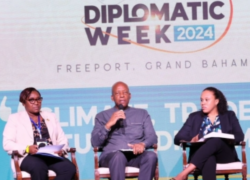
By Journal Staff Writer
America was built on it. Singapore thrives because of it.
Immigrants usually make a country better especially when the
population is small and skills limited.
Minister of Immigration and National Insurance, Alfred Sears says
when it comes to the issues surrounding migration The Bahamas
finds itself trying to balance national security interests of the
country and human rights obligations. At the same time, he said
public policy should not be dictated by chauvinism or by petty
nationalism.
The issue of migration and illegal immigration took center stage at
a panel discussion on “understanding the complexities of
migration management” during an event at the recently held
Diplomatic Week in Grand Bahama.
Minister Sears served as a panelist for the discussion, along with
Her Excellency Gezel Farrington, Ambassador-at-Large for
Human Rights; His Excellency Dennis Zulu, UN Resident
Coordinator for The Bahamas, Bermuda, Cayman Islands, Turks
& Caicos and Jamaica; Ms. Zahrah Jibrilu, Project Officer,
International Organization for Migration (IOM); His Excellency Dr.
Ellison Rahming, Ambassador to the Republic of Cuba; and Mr.
Crispin Hall, of the United Nations High Commission for Refugees
(UNHCR).
The panel discussion quickly took on a life of its own, as
delegates shared stories about migration and illegal immigration
in various countries.
In his presentation Minister Sears pointed out that migration that
is regulated and legal can have a positive outcome for The
Bahamas.
“Immigrants play a critical role in the economic life of our country
and contribute, not just economically, but culturally to our society,”
he added.
“The challenge for The Bahamas has been the undocumented
migrants.”
“Given the porous nature of our borders and a boundary that
stretches over 200,000 miles, maintaining the restriction on
unauthorized entry has always been a challenge.”
He said this challenge becomes even more complicated by the
fact that The Bahamas entertains millions of visitors every year to
its shores. That means for most months of the year, The
Bahamas will have more visitor numbers in the country than it has
in local population.
The immigration minister noted that as a result, the management
of border security must be very sophisticated and rely on
intelligence to ensure that those who may pose a threat to the
security of the country are refused entry.
During the panel discussion it was established that negative
public perception may lie in the fact that there is a
misunderstanding of the terms “migration” and “immigration.”
Asked why an important point of discussion has surrounded a
policy shift from migration restriction to migration management,
Minister Sears simply stated that migration is multi-dimensional.
Adding that such a multi-dimensional situation requires more than
just restrictions at the border, but collaboration with multi-lateral
organizations, and collaboration on a bi-lateral level, as the nation
relies on other countries for assistance.
He warned that a singular approach on an assumption that
migration is inherently bad and therefore demands rigid restriction
at the ports of entry does not capture the complexity of the matter
of legal migration.
He reminded the panel that migration has been a prominent
feature in The Bahamas not just today, but historically.
He pointed to the time when a young Bahamian nation struggled
for majority rule, many of the leaders of that movement, who also
later became leaders of the nation came from homes where one
or both parents were migrants.
The “Father of the Nation” for example, he noted Sir Lynden and
other first cabinet members were children of immigrants.
“So, immigrants have historically played a critical role in The
Bahamas.”
Minister Sears pointed out that for decades and even today,
migration has benefited The Bahamas in the areas of education,
where expat teachers have been a constant flow; in the field of
health, where for a long time doctors and nurses in The Bahamas
hailed from other countries like Jamaica, Trinidad, Barbados,
Cuba, and other parts of the world.
Even construction, Minister Sears explained, has benefited from
migrant workers in The Bahamas.
Sociologists would agree that migration and immigration is good for a
developing country like The Bahamas. The key is to ensuring like they
do in the USA and Singapore that they assimilate and let their cultures
enhance that of the country they migrate to.


